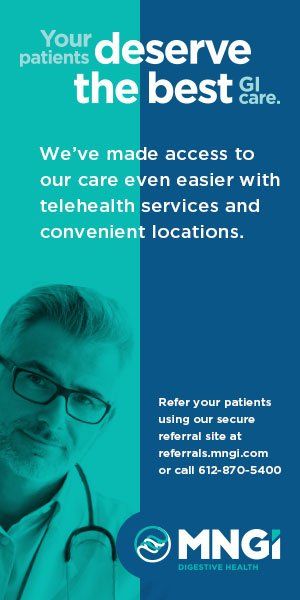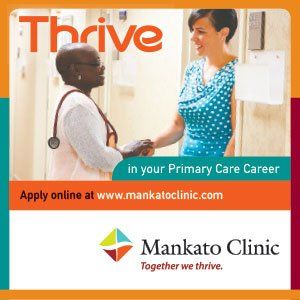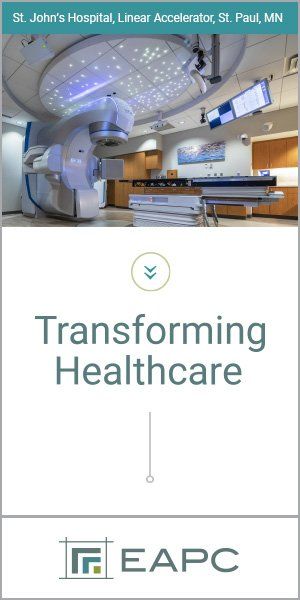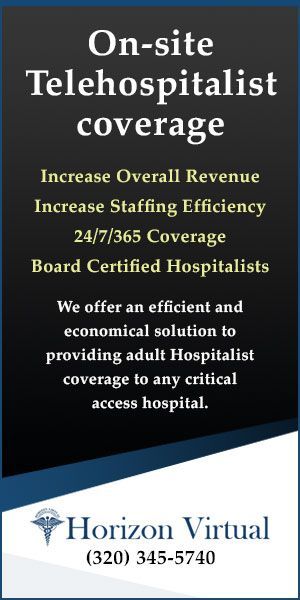Capsules
St. Luke’s Finalizes Affiliation with Aspirus
St. Luke’s has officially finalized its affiliation with Aspirus Health based in Wausau, Wisconsin. The expanded health system now operates 19 hospitals and 130 outpatient locations with nearly 14,000 team members, including 1,300 employed physicians and advanced practice clinicians across northeastern Minnesota, northern and central Wisconsin and the Upper Peninsula of Michigan. The system will operate headquarters in Wausau and maintain a corporate office in Duluth. “We are proud to welcome St. Luke’s and Lake View to the Aspirus family,” said Matt Heywood, Aspirus Health president and CEO. “Our collective strengths will improve health for our communities, and we look forward to what the future holds for our patients, staff and all who rely on our system for excellent care. Our combined team can now begin working together as champions for the future of health in our communities.” Nicholas Van Deelen, MD, St. Luke’s co-president said, “Today is an historic day. From our founding in 1881, St. Luke’s has built a legacy as a patient-focused organization above all else. We are proud to join Aspirus Health to advance services and access in our region. Our like-minded cultures and values are rooted in serving people. The completion of our affiliation will benefit our employees, partners and the communities we serve for generations to come.” Both Aspirus and St. Luke’s have worked diligently since announcing a letter of intent to affiliate last summer, including signing a definitive agreement, completing due diligence and participating in a public forum with the Minnesota attorney general’s office in Duluth last fall. The affiliation has satisfied all necessary governmental notices, waiting periods and approvals, and completed the Minnesota attorney general’s review process. “We appreciate the support this affiliation received from all officials involved,” Heywood said. Heywood will continue to serve as president and CEO of Aspirus Health, and Van Deelen and Eric Lohn will continue to serve as co-presidents of St. Luke’s. Together, St. Luke’s and Aspirus will be an innovative, forward-looking system that will transform to meet the health needs of the changing region.
MDH Rejects Proposed New Hospital
The Minnesota Department of Health (MDH) recently announced that a proposed new, freestanding Nobis Rehabilitation Partners hospital in Roseville is not in the public interest. After an extensive mandatory review by the agency’s Health Economics Program, MDH found that the proposed 60-bed rehabilitation hospital would establish unneeded, costly capacity and may destabilize the existing rehabilitation care delivery system. “MDH and its Health Economics Program take our statutory role in the public interest review process seriously and go to great lengths to provide transparent, impartial reviews of all proposals for new hospitals,” said Minnesota Commissioner of Health Dr. Brooke Cunningham. In 2023, Nobis Rehabilitation Partners submitted a letter of intent notifying MDH of its plan to construct a $42.9 million, 60-bed, freestanding specialty hospital to serve certain patients with rehabilitation needs residing in the seven-county Twin Cities metropolitan area. The final application was deemed complete and ready for review on Sept. 29, 2023.
MDH reached its determination that the project is not in the public interest based on four primary considerations:
- Adequate capacity within the intended service region based on an analysis of occupancy levels and miles traveled by patients to obtain care.
- A lack of evidence that that the proposed facility would offer higher quality of care than is currently available to patients.
- Concerns that the proposed hospital would have a negative financial and workforce impact on existing facilities.
- A lack of explicit commitments in the project proposal for providing care to low-income and nonpaying patients.
MDH’s analysis raised concerns about whether the incentives associated with a private equity-financed for-profit hospital could contribute to destabilizing the existing market and pointed to an aggressive growth strategy by Nobis and its investment partners that resulted in the establishment of 20 facilities in 12 states just since 2021. MDH State Health Economist Stefan Gildemeister said. “We appreciate the proposal for a freestanding hospital Nobis has brought forward. However, our analysis indicates that this project attempts to solve a problem that does not exist within the proposed service area and, in fact, could create greater systemic challenges if approved.”
Herself Health Opens Third Twin Cities Clinic
Herself Health, the first health care company providing comprehensive, value-based primary care to women 65+, launched its third clinic in Southwest Minneapolis. The clinic opening comes just four months after the company opened its second clinic in Crystal and over a year after its first clinic in Saint Paul. The new clinic will create around 20 jobs and serve 3,000 patients. Herself Health was founded in 2022 to deliver advanced primary care designed for the unique needs of women over 65 years old.
Older women are often ignored, dismissed and misdiagnosed by the U.S. health care system, face worse health outcomes than men, and are uniquely impacted by diseases like Alzheimer’s, heart disease, arthritis and osteoporosis, among others. Despite this, most clinical research remains focused on men, and medical schools provide little training in female geriatrics. “The opening of our third clinic in just over a year makes it clear that the older women of the Twin Cities are tired of the one-size-fits-all health care they are accustomed to. They want primary care designed for their unique needs,” said Kristen Helton, CEO of Herself Health. “Herself Health is proud to bring our value-based primary care solution and community-building efforts to thousands of more women through our new Lyndale clinic, right in the heart of Minneapolis. We are incredibly grateful to all of the Herself Health team members who led the efforts to open this clinic and the many members of the Minneapolis community who supported us.” Minneapolis Mayor Jacob Frey, who attended the ribbon cutting ceremony, said, “Our entire city benefits when we have innovative and targeted solutions available to meet people where they are at. In this case, Herself Health has stepped up to provide meaningful care for older women in our community – serving thousands of our neighbors and creating valuable jobs at the same time. Herself Health is tackling complex healthcare challenges while offering a much-needed space for older women in the Twin Cities to connect and grow.” Herself Health will be opening a fourth clinic in the region later this year located in Roseville.
U of M Family Medicine Department Leads Nation in NIH Grant Funding
The Blue Ridge Institute for Medical Research (BRIMR), a North Carolina-based independent nonprofit organization, recently released its annual report. Since 2006, BRIMR has collected and released data tracking grants awarded by the National Institutes of Health (NIH). Among 2023 findings, several University of Minnesota Medical School departments earned a top position. Notably, the Department of Family Medicine and Community Health rose to the No. 1 spot among all family medicine programs in the U.S. — bringing in more than $23.5 million in NIH grants. These grants are critical outside resources the medical school brings to Minnesota that support the research and discoveries that lead to healthier lives and better health care. “This accomplishment is the result of an enormous team effort reflecting the work of faculty and staff in the Departments of Family Medicine and Community Health, Family Medicine and Biobehavioral Health, and now the Division of Physical Therapy and Rehabilitation Services,” said James Pacala, MD, MS, head of the Department of Family Medicine and Community Health. “Grant funding involves a tremendous amount of collaborative work — from the PI and all other investigators to the grants management team, the pre-award and finance teams and the research support team. All are indispensable to the research that results from it, and this success is a collective achievement.” Peter Crawford, MD, PhD, vice dean for research at the U of M medical school added, “Blue Ridge is one of the guideposts that measures how well we serve the public mission of our medical school. Our commitment to pioneering research has transformed care and excellent outcomes for cancer, immunopathology, infectious disease, cardiovascular and neurological disease, addiction, and aging patients. We are particularly proud that our Family Medicine program leads the nation.” Three other departments secured a place in the top 10 of their respective categories. The Department of Surgery ranked No. 4 with $20,604,572 in funding; the Department of Biochemistry, Molecular Biology and Biophysics ranked No. 6 with $18,154,271 in funding; and the Department of Pediatrics ranked at No. 7 with $43,913,313.
CentraCare Expands Outstate Mental
Health Services
CentraCare recently announced the expansion of its Integrated Behavioral Health (IBH) services to the Big Lake and Becker communities, furthering the commitment to providing accessible and comprehensive health care to patients. Becker has a population of only about 5,000 and Big Lake has around 12,000 residents. Offering these services directly in smaller communities illustrates the importance addressing behavioral health can have on overall health. IBH bridges the gap between mental and physical health care services for patients who are established with a primary care provider within CentraCare or those looking to establish care within the network. Now accessible in more than 30 facilities across CentraCare, IBH offers vital mental health support directly within primary and specialty care clinics. Recognizing that physical and emotional health are a big part of well-being IBH addresses many specific conditions including;
- Anxiety
- Asthma management
- Chronic pain management
- Coping with life events
- Depression
- Diabetes management
- Family stressors
- Grief and loss
- High blood pressure
- Lifestyle health
- Mental health
- Relationship difficulties
- Sleep difficulties
- Smoking cessation
- Substance use
The addition of IBH services to the Big Lake and Becker communities is a significant step forward in enhancing mental health care accessibility. Patients now have quick access to mental health support during their primary care visits. IBH providers can seamlessly join patient appointments upon request, allowing medical providers to continue caring for other patients. IBH psychologist Gretchen Moos, MSW, LICSW, expressed enthusiasm about the expansion, stating, “We are thrilled to offer this incredible mental health service to the members of the Big Lake and Becker communities. By integrating behavioral health services into primary care settings, we aim to improve access to care, reduce stigma, and provide holistic support to our patients.”
St. David’s Center Announces Expansion Plans
St. David’s Center, a regional leader in child and family development, recently announced significant plans to increase the reach of its services. Offering therapeutic, educational, and support services, including mental health and pediatric therapies, autism treatment, home visiting, an inclusive preschool, and disability services, St. David’s Center, founded in 1961, currently serves children and families at two early intervention centers in Minneapolis and Minnetonka, more than 30 partner sites, and hundreds of homes across the community. Last year, St. David’s Center’s team of over 500 served nearly 5,000 children and hundreds of family homes with a waiting list of nearly 2,000 children and no available space to provide care. After extensive research and discussion with county and state leaders, meetings with legislators and discussions with families, the decision was made to increase capacity in both Greater Minnesota and the Twin Cities. In partnership with a large employer in St. Cloud, a new early education and intervention center to address the current child care crisis and escalating behavioral health needs in Central Minnesota will be operational by 2025.
To address needs in the Twin Cities, St. David’s Center reached out to the YWCA to connect its programs to the Harman Center with their ECE programs to ensure families in downtown Minneapolis access to high quality child care, early intervention and treatment. This lead to the recent purchase of the YWCA facility on the corner of 12th and Nicollet. The 124,000-square-foot building will serve the needs of parents, pediatricians, educators, county social workers, and the community as a whole.
At capacity, providing services at and out of what will be a state-of-the-art early education, early intervention, and support services center, St. David’s Center will reach an additional 1,500 to 2,000 families annually. The Minnetonka campus and the Harman Center for Child & Family Wellbeing in Westminster Presbyterian Church will continue to reach as many children and families as possible.
MORE STORIES IN THIS ISSUE
cover story one
Physicians and Adaptive Change: The little med school on the prairie
By Cindy Firkins-Smith, MD, MHCI, FAAD
cover story two
Anatomy of a Cyberattack: The Change Healthcare incident















